The Real Sleep Report 2023
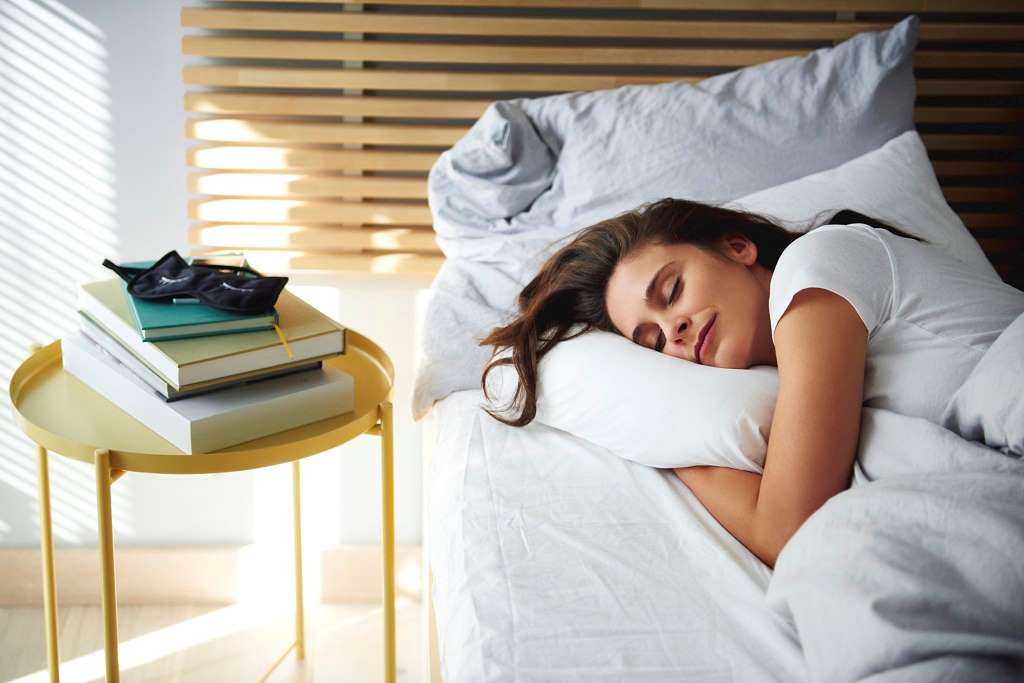
31 Oct 2023
In a world dominated by constant connectivity and increasing stress, are sleepless nights and restless days becoming the new norm? A considerable number of Aussies find themselves tossing and turning at night, kept awake by their anxieties and worries, with many also contending with diagnosed sleep issues. Such sleep deprivation is taking a toll on their overall well-being, affecting health, relationships, and work performance.
The Real Sleep Report 2023, part of Real Insurance's Research Series, explores the relationship between Aussies and sleep, and the far-reaching consequences of sleep deprivation. The study focuses on the factors attributing to sleep struggles, the impact of parenthood on sleep habits, and the strategies used to improve sleep quality.
The research found that close to 2 in 5 (39%) Aussies constantly or frequently battle with falling asleep. Stress and anxiety rank as the top reason keeping Aussies awake (53%). Financial worries (42%) and family concerns (36%) also play major roles in contributing to sleepless nights. Interestingly, women are more inclined than men to attribute these factors to their sleep struggles.
The report further reveals that nearly half (49%) grapple with certain sleep issues, such as insomnia, heavy snoring, restless legs syndrome, sleep apnoea, or chronic fatigue.
Additionally, while most (55%) Australians believe that 8 hours or more is the ideal amount of sleep, the average person falls slightly short, clocking in around 7 hours of sleep per night.
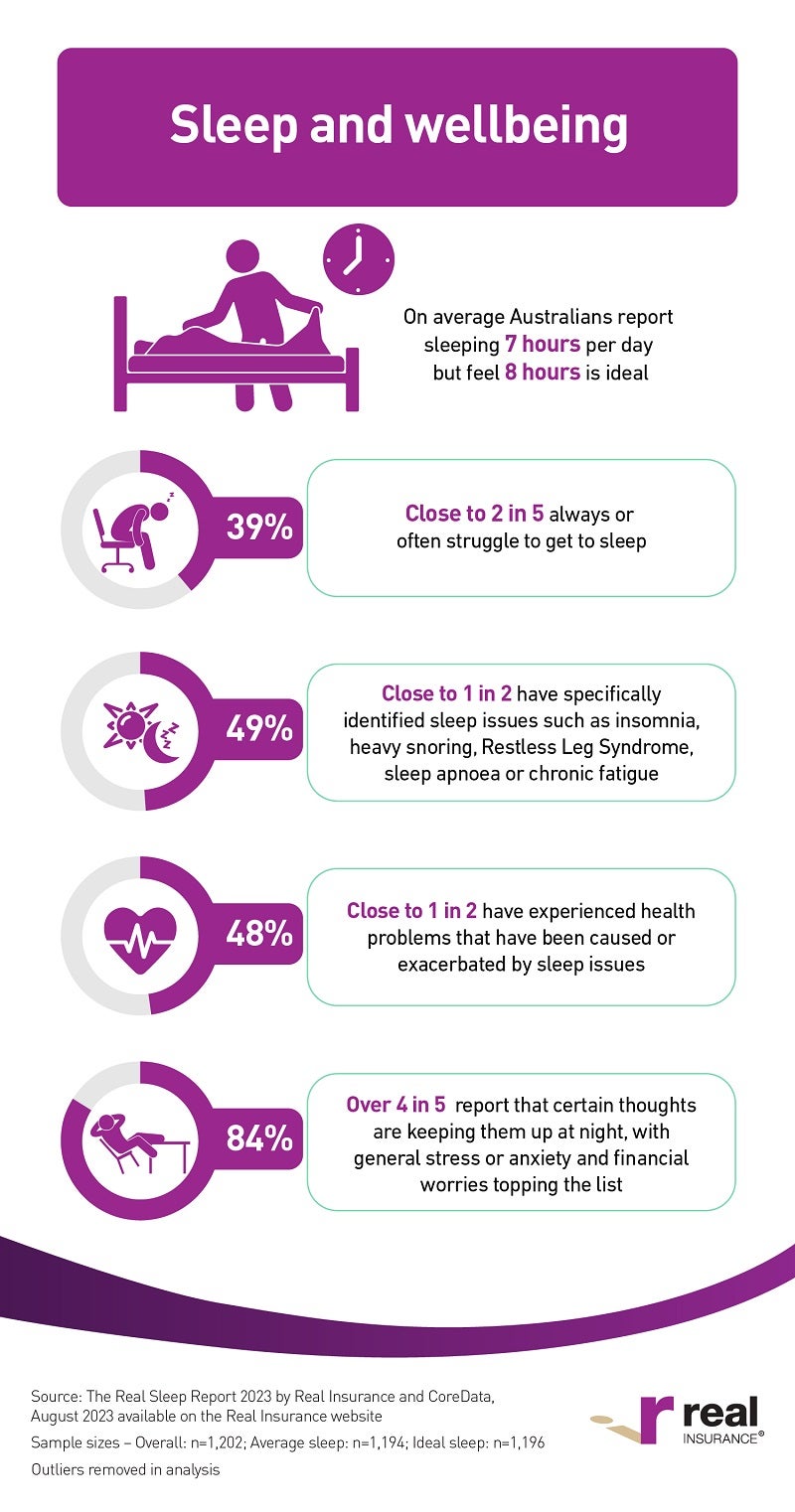
Sleep deprivation: a silent threat to health
We all know a poor sleep can ruin your day, but does it end there? Nearly half of the respondents (48%) have encountered health problems as a result of sleep issues, with mental health most commonly affected (22%).
But they’re determined to sleep better, with almost 9 in 10 (87%) making certain lifestyle choices to aid their sleep.
So, what are their strategies? Over half (52%) have tried medication, supplements, or natural therapies in hopes of a better sleep, and more than 1 in 4 (26%) are seeing or have consulted a sleep specialist, GP, or other medical professional.
Further, just under half (49%) have established a regular sleep schedule to improve their sleep, while a similar proportion have attempted to steer clear of caffeine, alcohol, and nicotine, especially before bedtime (47%).
Meanwhile, over 2 in 5 (44%) have experimented with a balanced diet, and more than 1 in 10 (11%) have even moved to a quieter location to improve their sleep quality.
Additionally, some Aussies are spending money on bedding improvements to help improve their sleep, such as special pillows (25%), a special mattress (18%), and special blankets (11%).
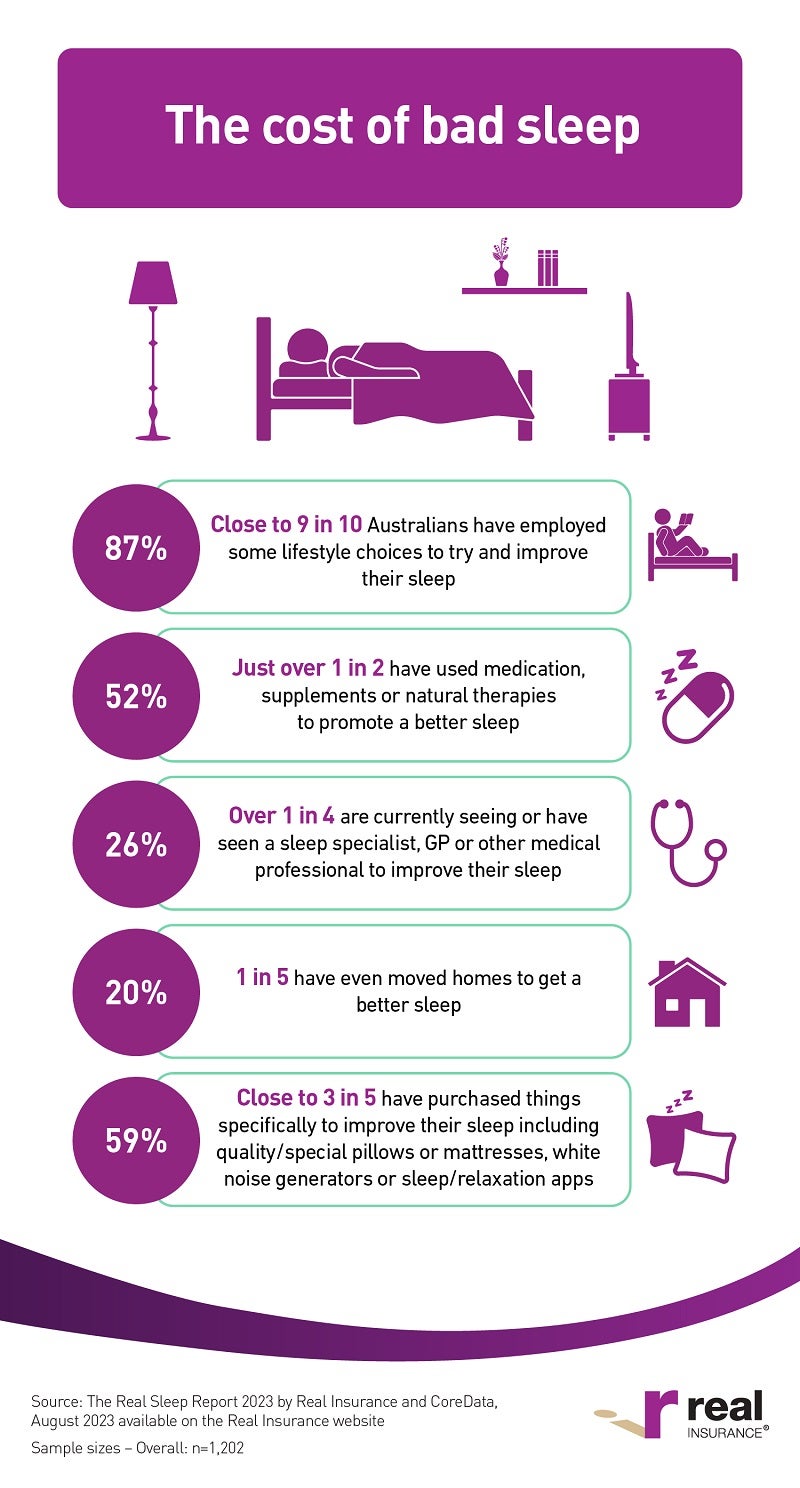
What happened to pillow talk?
The sweet exchange of words under the covers before drifting off to sleep seems to be a thing of the past for many Aussie couples.
It turns out it’s not just things like financial stress and infidelity that take a toll on our relationships; poor sleep habits can also compromise our love lives.
According to the sleep study, more than 3 in 5 (64%) Aussies in serious relationships have reported that they or their partners keep each other awake at night, and 40% claim this has put a strain on their relationship.
In fact, these sleep issues have become so troublesome that nearly 2 in 5 (38%) couples have resorted to sleeping in separate rooms.
It's also clear from the research that sleep is becoming a priority over intimacy for many couples, with almost half (48%) prioritising sleep over sex. And with more than 3 in 5 (63%) Aussies saying that a lack of sleep negatively affects their libido, it’s no wonder intimacy is suffering.
Only 11% of couples prioritise sex over getting a good night's rest, despite more than 2 in 3 (68%) reporting that frequent sex significantly improves their sleep. For most, it seems like a healthy sex life and quality sleep go hand in hand.
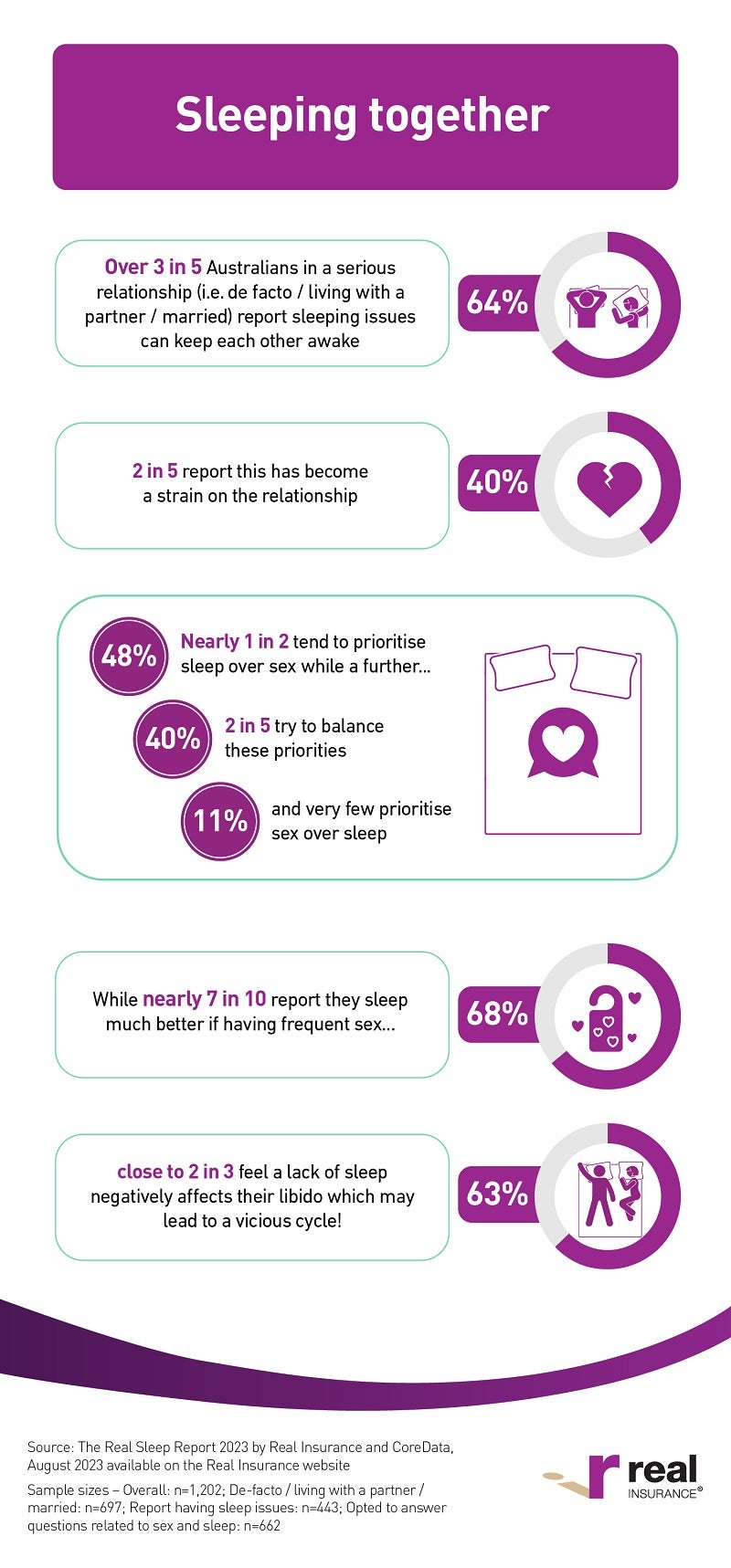
Sleeping on the job: Sleep deprivation leaves employees struggling
The impacts of sleep deprivation go beyond life at home, with many Aussies claiming that their work can suffer too.
According to the study, close to 3 in 5 (59%) said that a lack of sleep negatively impacts their workday at least twice a week. Further, close to a third (31%) admitted that their work performance is considerably affected by the amount of sleep they get
With sleep playing a pivotal role in how we function, it’s no wonder more than 2 in 5 (42%) have called in sick in the last 12 months due to lack of sleep. 1 in 5 (20%) have even taken three or more sick days for the same reason.
To cope with their fatigue, more than 2 in 5 (42%) Aussies admitted to relying on caffeine or other legal stimulants to wake them up in the morning. Among the caffeine drinkers, a staggering 44% said they consume two or more drinks before midday just to get their day started!
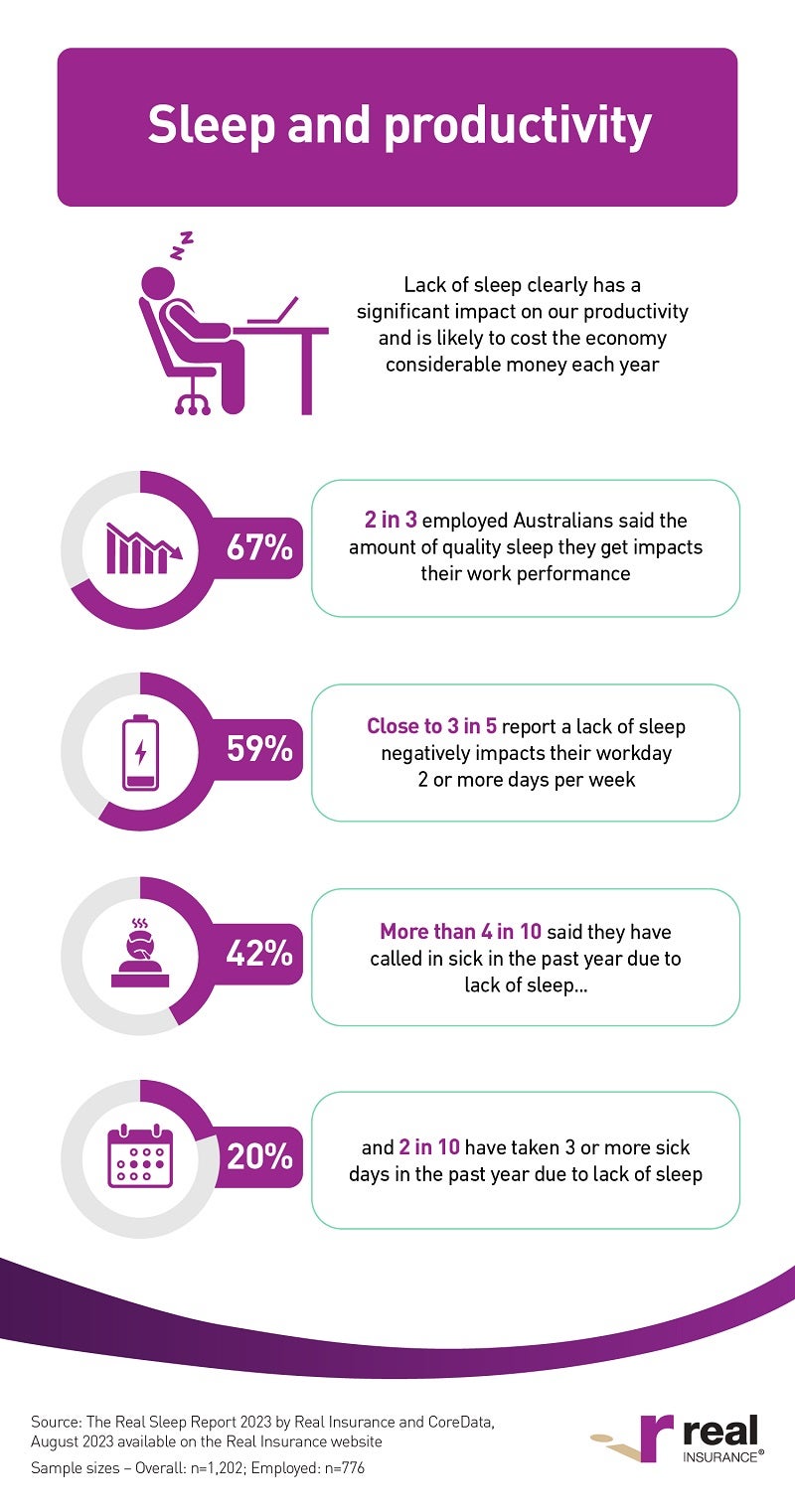
Parents – it’s all about sleep!
It's not always a smooth ride when it comes to getting children to bed on time. In fact, more than 1 in 5 (21%) parents find it challenging to establish a bedtime routine, while 1 in 6 (16%) face the constant struggle of dealing with their children waking up multiple times during the night.
More than 1 in 2 (56%) parents expressed concern about the impact of sleep on their children. These concerns are not unfounded, with most parents (81%) observing various negative consequences when their children don't get enough sleep.
But what are the key challenges parents face when their little ones are sleep deprived? While it can differ from child to child, many parents (44%) noticed behavioural problems, difficulty focusing and sustaining attention (39%), and mood disorders (24%). In response to these concerns, an overwhelming 85% of parents with children below 18 years old have implemented a bedtime routine to ensure their young ones get the rest they need.
But establishing a bedtime routine does require a time investment. On average, Aussie parents spend approximately 64 minutes putting their 0–3 year olds to bed, 53 minutes for their 4–7 year olds, and 39 minutes for their 8–12 year olds.
For most parents, it’s not just their children’s sleep they need to worry about, with close to 3 in 4 (72%) saying their own sleep quality has suffered since having kids. As many parents know, sometimes the little ones find their way into your bed. In fact, over the previous 12 months, 27% of parents said they always let their 0–3 year olds sleep with them, followed by 21% for the 4–7 year olds and 5% for the 8–12 year olds.
Despite the challenges and sleep disturbances, there is hope. As kids grow older and more independent, their sleep patterns tend to improve – a relief for any parent currently struggling to get a good night’s sleep.
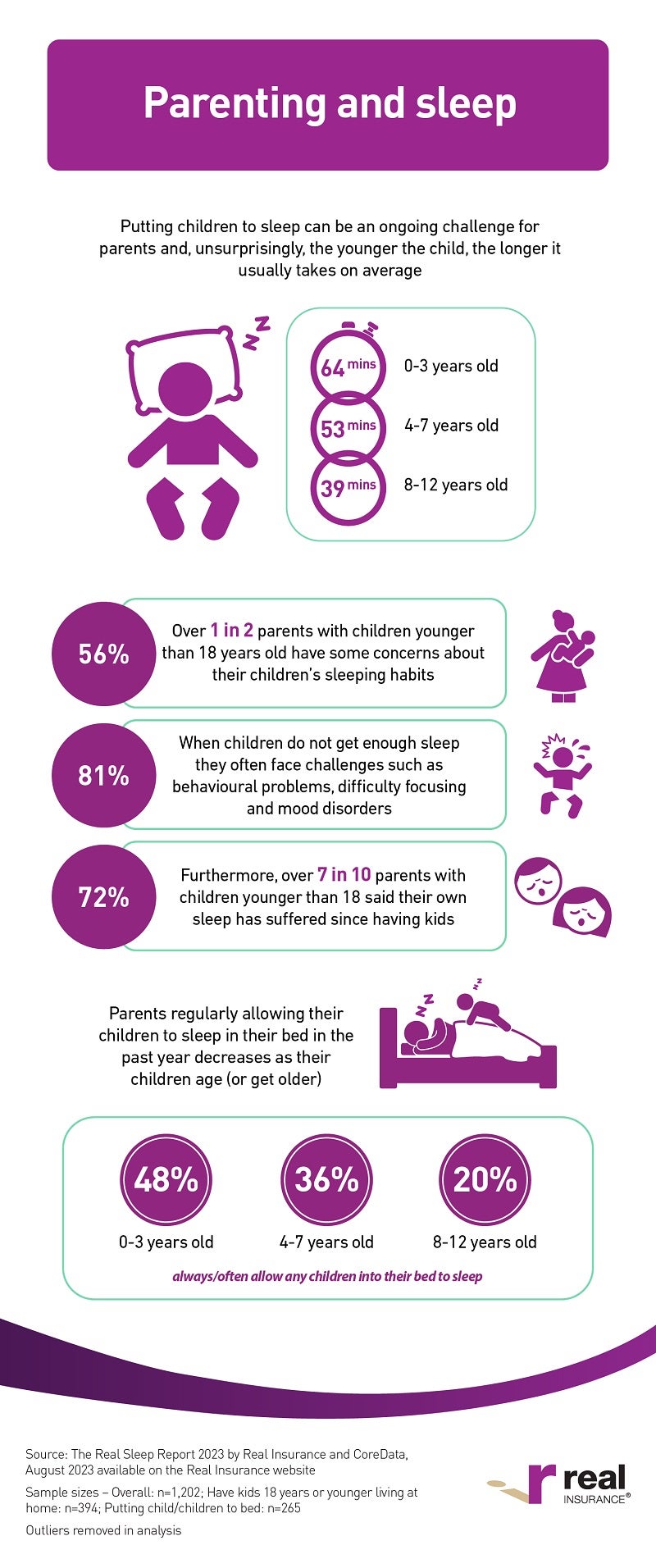
Goodnight, sleep tight
The results of the research clearly demonstrates that lack of sleep is a significant issue affecting many Aussies, with repercussions extending far beyond simply feeling drowsy. Sleep deprivation takes a toll on our physical health, mental well-being, relationships, and even our careers. Yet, among these seemingly concerning findings, we see a glimmer of hope and empowerment. The path to improving our sleep quality is closer than we think. By adopting healthy sleep habits, such as establishing a consistent sleep schedule, creating a relaxing bedtime routine, exercising regularly and sustaining a balanced diet, we can positively guide our sleep patterns. Embracing self-care is a crucial part of this journey, acknowledging that prioritising proper rest, forms the basis of a more rewarding and productive life.
Discover more insights in the Real Sleep Report 2023.